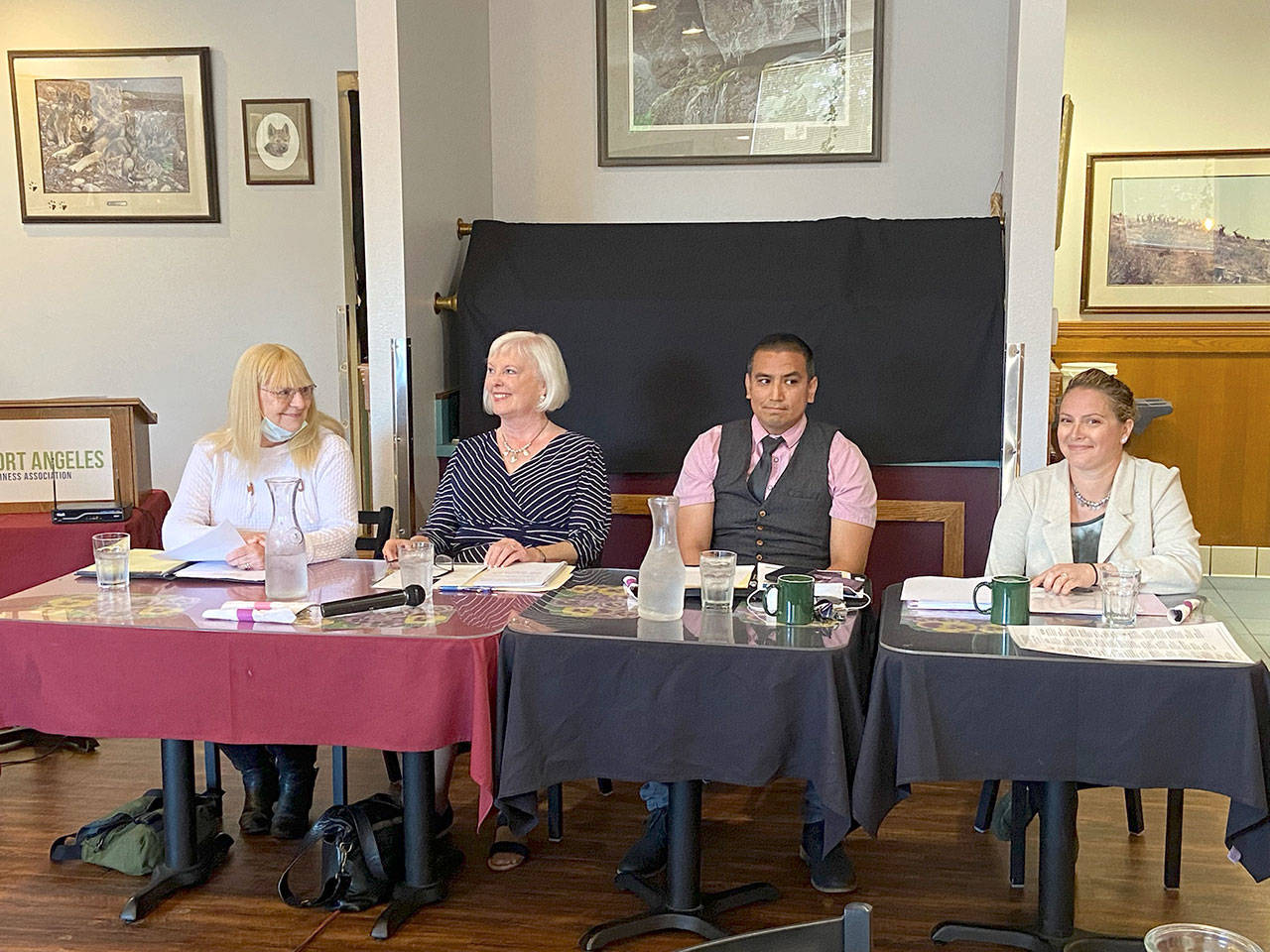PORT ANGELES — Four candidates vying for a Port Angeles School Board seat debated critical race theory, sex education and student inequality in a Tuesday forum.
Jesse Charles, Mary Hebert, Gabi Johnson and Jean Stratton agreed that the return to full-time, in-person classes after a year and a half of COVID-19 restrictions will be the No. 1 challenge facing the district and its 2,600 students this fall.
Charles, Hebert, Johnson and Stratton are running in the Aug. 3 primary election for the Position No. 2 seat currently held by 20-year board member Cindy Kelly. The two who get the most votes will face off in the Nov. 2 general election.
The four candidates were asked in a Port Angeles Business Association breakfast meeting to weigh in on critical race theory and comprehensive sex education.
Johnson said critical race theory was “not part of the curriculum here.”
“My biggest concern at this very moment in time is getting our kids academically where they need to be,” Johnson said.
“All other things aside, I want my kids to learn to be kind human beings to everyone, regardless of what they are, and it’s a slippery slope, so I’m just going to leave it at that. It’s not even an issue right now in our district.”
Critical race theory (CRT) is an academic movement of U.S. civil-rights scholars and activists who seek to critically examine the law as it intersects with issues of race and to challenge mainstream liberal approaches to racial justice, according to Wikipedia.
Johnson, who works full-time for her family’s Arrow Marine Services and has five children in the Port Angeles School District, said the sex education was another “tough” subject.
“I think it’s important to have something for kids whose parents can’t have those discussions at home,” Johnson said.
Charles, a youth social worker and director of Healthy Transitions in Port Angeles, said critical race theory is highly controversial.
“It’s two sides of the border right there on is it ‘systemic racism, is it built into our culture,’ and teaching that, depending on what age we want to teach that, that’s a very controversial thing to do,” Charles said.
Charles and the other candidates said the COVID-19 reopening plan is the main concern for fall.
“When it comes to the sex education, again, it’s already in play,” Charles said, referring to the voter-approved comprehensive sex education mandate.
“It’s been proven. There’s statistics that it reduces teenage pregnancy, and so it’s just something people need to do.”
Stratton, a retired library branch manager and regional Girl Scouts of the USA executive, said she needed to learn more about critical race theory.
“I think that it will be a good thing once we all understand it and we find the right time to introduce it,” Stratton said.
“I have gone on and researched the sexual education component, and I like a lot, and here’s why: It’s all broken down by grade levels,” Stratton said.
“The grade level my daughter was in is teaching about just good general health and emotional health, and empathy, learning empathy, and those kinds of things are tied up in that.”
Hebert, a former teacher, principal and Port Angeles School District assistant superintendent, said teachers foster a culture of acceptance in their classrooms.
“I think that we continuously have to evaluate what’s the depth of the curriculum, what is it that we want for the outcome, and what does our community want our students to be able to learn and do when they graduate from Port Angeles High School,” Hebert said.
“That should be another driving factor of what we decide is relevant curriculum.”
The candidates were asked whether they believed the Port Angeles School District has an “even playing field” for all students.
Charles, a member of the Lower Elwha Klallam Tribe, recalled missing recess as punishment for misspelling the name of Christopher Columbus, who was taught as the man who “discovered America.”
“He didn’t discover anything,” Charles said.
“I also remember in high school, I fractured my hip in the school gym and nobody came to my help. Not one of the teachers. … Nobody cared until the principal called me in a couple of weeks later, making sure I wasn’t going to sue.
“I would call that an uneven playing field, especially growing up in the system as a Native American,” Charles added.
“You know, there is a big divide between the tribe and the town. I don’t like that one bit. It upsets me because we are one community.”
Stratton said economic disparities among families in the Port Angeles School District were another source of inequality.
“My elementary school, Franklin Elementary, was sending home food constantly throughout the pandemic,” Stratton told about 40 PABA members at Joshua’s Restaurant.
“Then, when the kids come back in for limited school on two days a week, they would send bags full of food home with kids who needed that extra food to get them over the next few days.”
Hebert said Dry Creek Elementary celebrated culture when she was principal there for five years.
“I don’t know that we’ll ever have an equal playing field, but I know that it is addressed regularly in the schools, because that creates the culture that we want for learning,” Hebert said.
“You can’t be free to learn if you’re struggling with all of those other pieces, some of which we have control over. We create the environment in each classroom.”
Johnson said the Port Angeles School District had done a “pretty good job” of addressing students’ needs during COVID-19.
“That was one of my favorite parts of the last year, was just seeing everyone rally behind the kids that needed it the most,” Johnson said.
________
Reporter Rob Ollikainen can be reached at rollikainen@peninsuladailynews.com.

